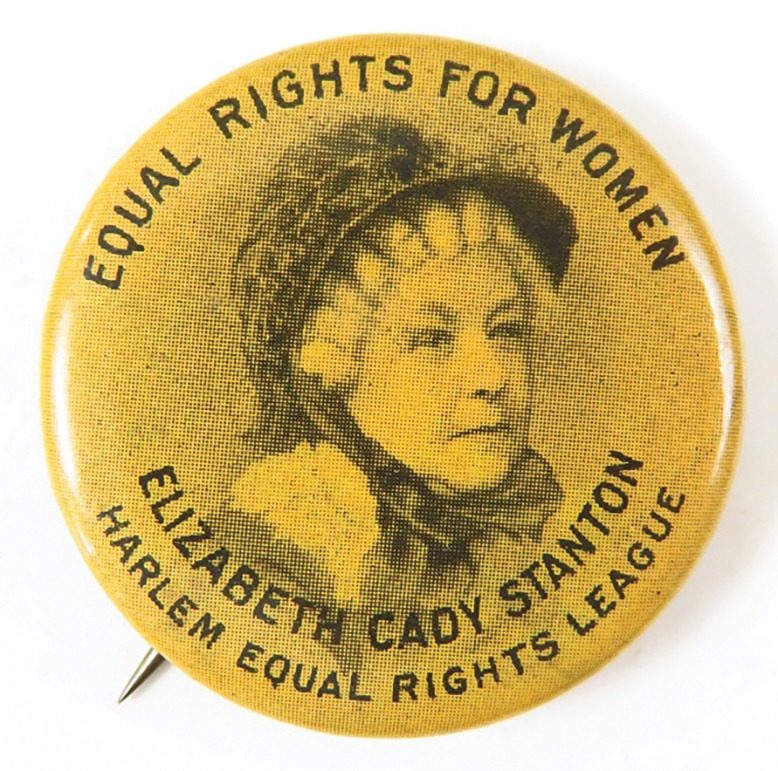
Alice Paul wasn’t the only influential suffragist to call New Jersey home. More than 70 New Jersey activists played leading roles in the decades-long struggle. The most prominent was New York–born Elizabeth Cady Stanton, who lived in Tenafly from 1868–1887.
Stanton, an early leader of the women’s suffrage movement, was also an early proponent of equal marriage rights, striking the word “obey” from her 1840 marriage vows.
Another early advocate for women’s rights was Lucy Stone, who, like Stanton, turned a wedding tradition on its head, refusing to adopt her husband’s last name when they married in 1855. In 1850, Stone organized the Women’s Rights Convention in Worcester, Massachusetts, her home state.
Seven years later, she moved to New Jersey, buying a house in Orange. Because she was prohibited from voting, she refused to pay property taxes, referring to them in a protest letter to town fathers as “taxation without representation.”
A month later, most of her possessions—even her baby Alice’s cradle—were seized to sell at auction to cover the tax bill. A neighbor purchased back several of the items for her.
[RELATED: A Guide to Events Celebrating the Centennial of Women’s Suffrage]
Stone and her equally progressive husband, Henry Browne Blackwell, moved in 1858 to West Bloomfield (now Montclair). Blackwell, a native of England, grew up in Jersey City. Together, the couple launched the feminist weekly newspaper Woman’s Journal and several women’s rights organizations.
Stanton and Stone’s daughters, Harriot Eaton Stanton Blatch and Alice Stone Blackwell, both grew up in New Jersey—Blatch from age 12, Blackwell from birth—and both later took up their mothers’ work, becoming influential suffragists themselves. While neither of their mothers lived to see the 19th Amendment ratified in 1920, both daughters did, Blatch at age 64, Blackwell at 63. In addition, each wrote a book about her famous mother.
Portia Gage of Landis (now Vineland) tried a defiant tactic to demand equal voting rights. On March 10, 1868, at age 55, she attempted (unsuccessfully) to vote in her town’s municipal election. Returning on November 3 for the presidential election, she brought with her 171 other women, who toted their own ballot box. Their votes weren’t counted. The box, thriftily created from blueberry crates, is now on display in Vineland’s Historical and Antiquarian Society.
Gage’s actions inspired other women across America to similarly test the right to vote. In 1880, at the Valley Hotel in Tenafly, Stanton made the same move, attempting to cast her ballot in the national elections, according to historian Kevin W. Wright. Again, no success.
Clara Laddey of Essex belonged to the Joint Legislation Committee of Woman Suffrage in New Jersey. She served as president of the New Jersey Woman Suffrage Association from 1908–1912 and marched at the head of the state’s delegation in the first women’s suffrage parade, held in New York City.
Lillian Ford Feickert of Plainfield was president of the New Jersey Woman Suffrage Association from 1912–1920, helped found the state’s League of Women Voters, and became the first New Jersey woman to run for U.S. Senate.
The Reverend Florence Spearing Randolph of Jersey City, and later Summit, and the Reverend Antoinette Brown Blackwell of Somerville, then Elizabeth, the first American woman to be ordained a mainstream Protestant minister, both used their faith as a foundation to help expand women’s rights. Blackwell’s husband Samuel (brother of Henry Browne Blackwell) was also an active suffragist. In 1867, Antoinette Brown Blackwell helped Stone found the New Jersey Woman Suffrage Association.
Randolph, the first African American woman to enroll at Drew University, founded the state’s chapter of the National Federation of Colored Women’s Clubs. A member of the executive committee of the New Jersey Woman Suffrage Association, she was able just prior to her 54th birthday in 1920 to vote for the first time, thanks to passage of the 19th Amendment. Brown Blackwell was 95 that year when she, too, voted for the first time. Both ministers cast their ballots for the Republican candidate, Warren G. Harding.



